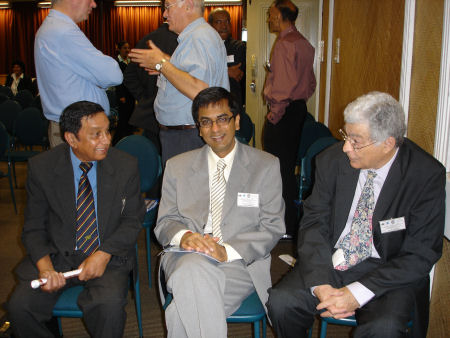 |
| From left to right: Justice Govind, High Court of Fiji, Justice Chandrachud, High Court of Mumbai and Justice Chaskalson, Constitutional Court of South Africa (formerly Chief Justice) |
In June 2006 a Pacific regional judicial colloquium and workshop held on the theme ‘Justiciability of Economic, Social and Cultural Rights in the Pacific’, over 40 international jurists agreed a number of practical conclusions and recommendations covering different aspects of economic, social and cultural rights (ESCR). These include an affirmation of the indivisibility of all rights, the need for effective and creative judicial remedies in securing redress for ESCR victims and for a liberal approach to standing in judicial proceedings and other procedural requirements in order to promote access to justice. Participants also stressed the importance of workshops and seminars, together with regular exchanges of information and judicial decisions, in supporting the work of the judiciary in promoting and protecting human rights.
INTERIGHTS, in conjunction with the Fiji Human Rights Commission, the United Nations High Commissioner for Human Rights (OHCHR) and the Commonwealth Secretariat organised the colloquium and workshop held in Suva, Fiji from 1-3 June 2006.
Following previous judicial capacity building events organised by INTERIGHTS’ Commonwealth Programme and the Fiji Human Rights Commission in 2003 and 2004, which focused on access to justice, equality and the war on terror, the 2006 seminar brought together jurists from across the Pacific Islands region, together with Australia and New Zealand, to discuss the role of and the challenges faced by the judiciary in protecting ESCR. The event was the first of its kind in the region and should contribute to the development of ESCR jurisprudence both locally and beyond.
INTERIGHTS, with the support of the Commonwealth Secretariat, secured the attendance of two eminent judges – the former Chief Justice of the Constitutional Court of South Africa Arthur Chaskalson and Justice Dhananjaya Chandrachud of the Bombay High Court. Both were able to offer unique insights into how South African and Indian judges have played a leading role in advancing ESCR jurisprudence through a variety of creative approaches whilst also seeking to maintain the separation of powers.
In addition to hearing commentaries on the papers by local judges, participants attended a number of sessions given by international experts on issues such as non-state actors and ESCR, the role of a national human rights institution in securing ESCR protection, the international legal framework and justiciability at the domestic level. These were complemented by a practical exercise on the right to health organised by the regional office of the OHCHR.
Throughout the three days of the event participants emphasised that there are a number of different national models for implementing ESCR and that the lack of constitutional entrenchment or domestic incorporation is not necessarily a bar to effective protection.
INTERIGHTS would like to thank the Commonwealth Secretariat, the Fiji Human Rights Commission, NZAID and the OHCHR for the funding gratefully received for the colloquium and workshop.
Related Links



